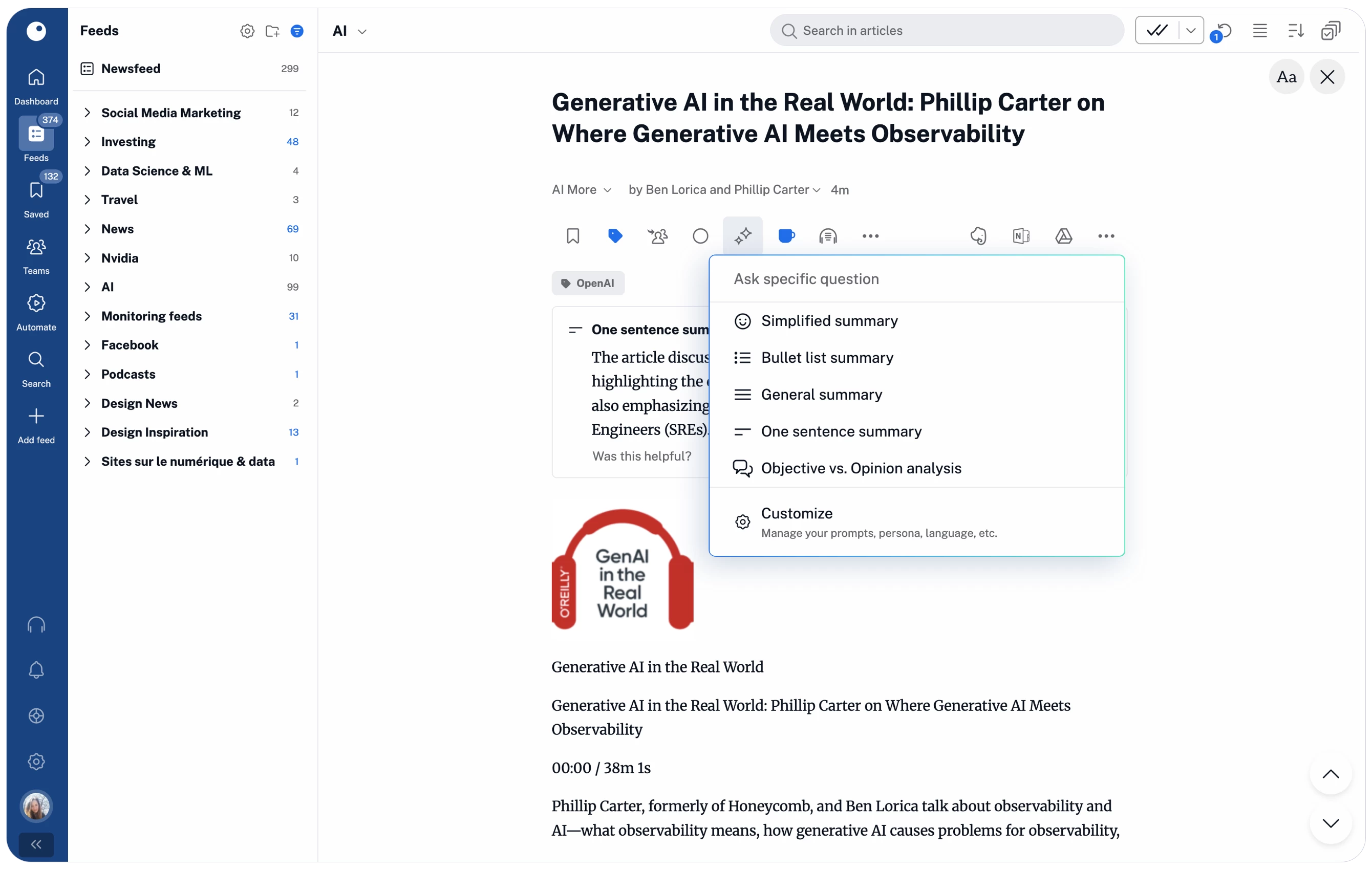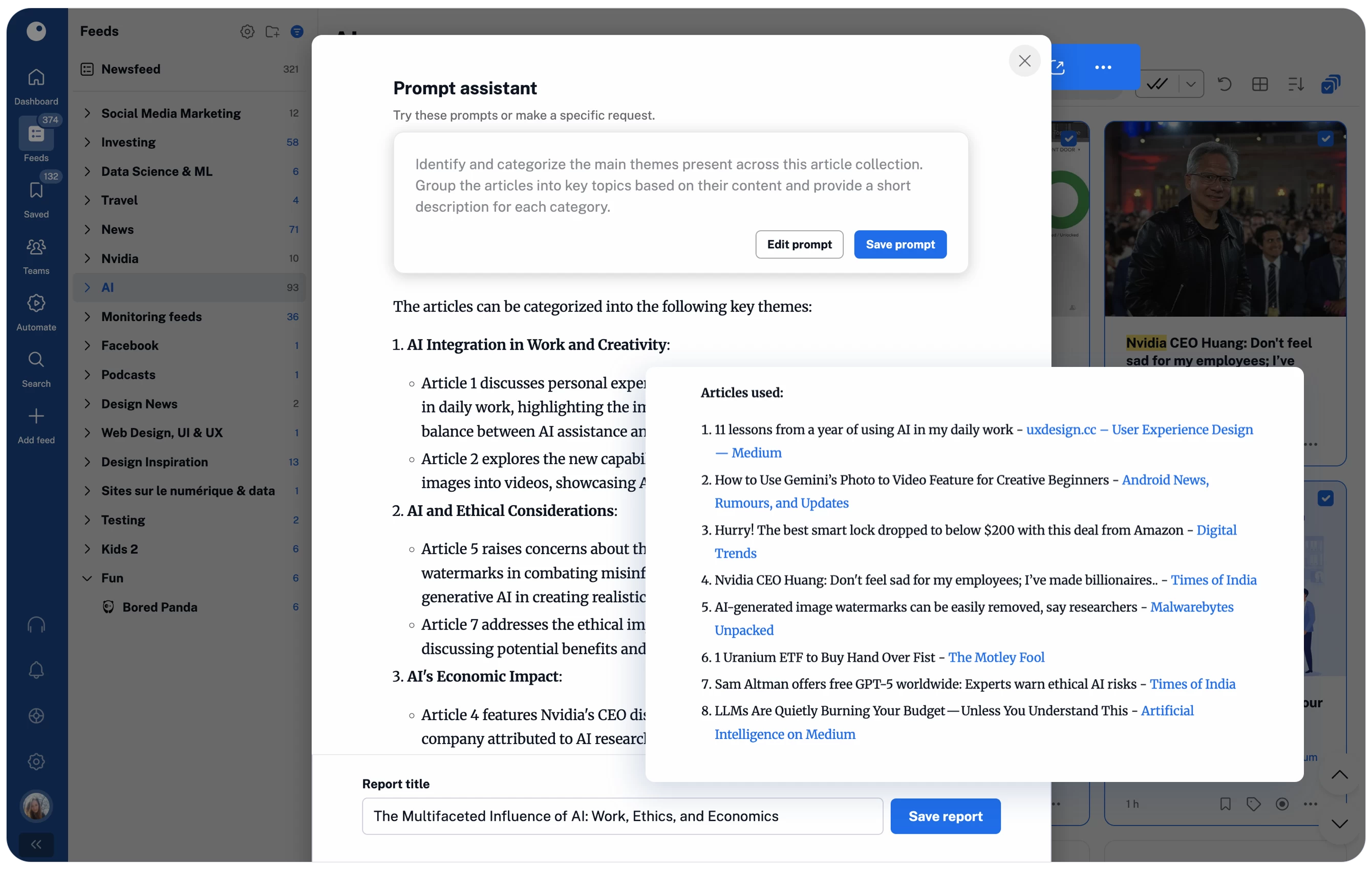Working in a research or content-focused team, keeping up with relevant news, industry analysis, and media coverage can be overwhelming due to the constant influx of information. Add the need to summarize articles, produce regular reports, and repurpose content for internal or external audiences, and the workload quickly becomes unmanageable.
Automating content processing is a powerful way to save time and ensure nothing important slips through the cracks. Once the information your team needs is summarized and structured, Inoreader helps you share it quickly and efficiently, whether that means preparing newsletters, internal briefings, or social media posts with just a few clicks.
Setting up your Inoreader engine
For individuals
Whether you’re monitoring a niche topic, building a media briefing, or writing social content based on the latest headlines, the process starts with adding and organizing your sources. Once you’re tracking what matters, Inoreader’s Intelligence tools help turn that content into actionable summaries and reports tailored to your use case.

- Step 1Use Inoreader to monitor your key sources
Follow websites, blogs, newsletters, Google News* and monitoring feeds for companies, people, or topics you follow. You can also pull in content from social media like Facebook pages, Bluesky and Reddit feeds, YouTube or Telegram channels. Use Inoreader’s search tool and featured collections to find public feeds, or import OPML files if you’re moving from another reader.
*Limitations may apply to Google News feeds. - Step 2Organize content with folders and suggested tags
Group feeds into folders by topic or priority. For more granular control, use suggested tags to quickly label articles by subtheme (e.g., regulation, market shifts, competitors), making them easier to retrieve or include in future reports and digests.
- Step 3Summarize articles with AI-powered prompts
This is where Inoreader’s Intelligence features truly shine. Instead of reading each article, you can run one-click summaries or apply custom prompts. Some examples used by teams today:
“Summarize and list companies mentioned in this article, including their role”
“Write a Bluesky thread about this topic in 3 posts, human tone, 300 characters max per post”
“Draft a short Raindrop.io-style description under 250 characters for bookmarking”
“Convert this into a TikTok script with a curious, optimistic tone”
You can choose from predefined prompts or create your own. - Step 4Turn multiple articles into a structured report
Use Intelligence reports to analyze multiple articles at once. For example, a competitive research team might run a weekly prompt like: “What trends in private equity can be inferred from this article set? Group by region. Extract stats, quotes, and themes.” Or a content editor preparing a newsletter might use: “Generate a daily newsletter: title (5-9 words), 20-word summary, and article source link.” This replaces hours of manual work with consistent, professional output – perfect for stakeholder reports or turning into blog and social content.
Once you’ve extracted the insights you need, you can annotate, export, and share them. Use multiple select to act on several items at once and save time generating takeaways. Bonus: all summaries and reports are searchable, turning your account into a living archive of insights.

On Team level
Unlock the power of AI-driven collaboration with a Team Intelligence plan. Once added, each Team member can discover relevant content and share valuable insights. In content-driven organizations, researchers and editors often collaborate on trend spotting, analysis, and publishing. Inoreader’s Team Intelligence plan enables structured workflows through shared folders, Team channels, and email digests.
- Step 1Set the Team
Start by having the Team admin invite all members. They’ll receive an email invitation to join the Team and start collaborating. If your organization uses SAML-based Single Sign-On (SSO), you can skip the invitation process. Team members can simply log in with their organization’s credentials, streamlining access and enhancing security through centralized authentication and higher-level access control.
- Step 2Create Team channels
Admins can create Team channels and invite relevant members. A media team might use channels like “Competitor mentions,” “Trend reports,” “Newsletter picks,” or “Q3 archive.” If your organization uses Microsoft Teams or Slack, you can integrate both with Inoreader for easier content distribution among platforms.
- Step 3Enhance the experience with Inoreader Intelligence
With a connected OpenAI API key, every Team member can access the full power of Intelligence features, ensuring faster performance and more consistent results. Whether you’re turning a set of articles into a weekly digest or summarizing news for a stakeholder update, Inoreader Intelligence helps your Team move from information to insight effortlessly.
Once everything is set up, Team members can generate summaries, run custom or predefined prompts, and compile structured reports from multiple articles at once. Your Team can use the time saved to focus on deeper analysis and better decision-making.
The typical workflow
- 1
Each user processes content from their feeds using summaries and suggested tags
- 2
Key insights and findings are shared in Team channels
- 3
Email digests and Intelligence reports are generated and distributed
Organizational wins
- Step 1Faster content production
Turn any article into a social post, summary, or newsletter blurb in seconds.
- Step 2More consistent reports
Use repeatable prompts to maintain quality, tone, and structure.
- Step 3Less manual work
Spend less time reading and more time analyzing with summaries and reports.